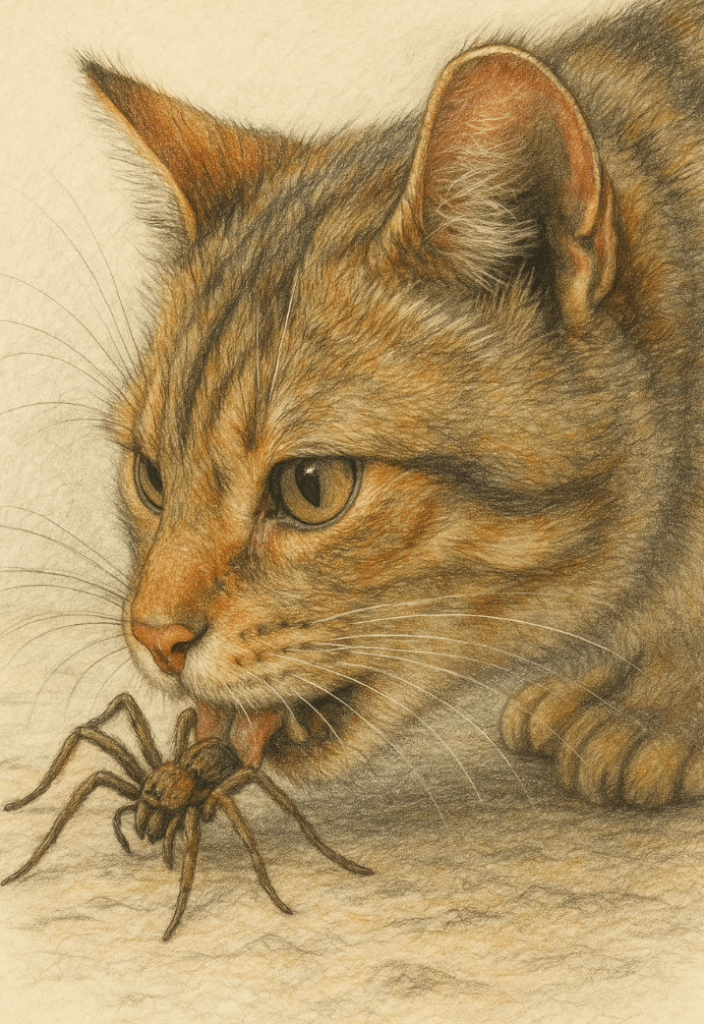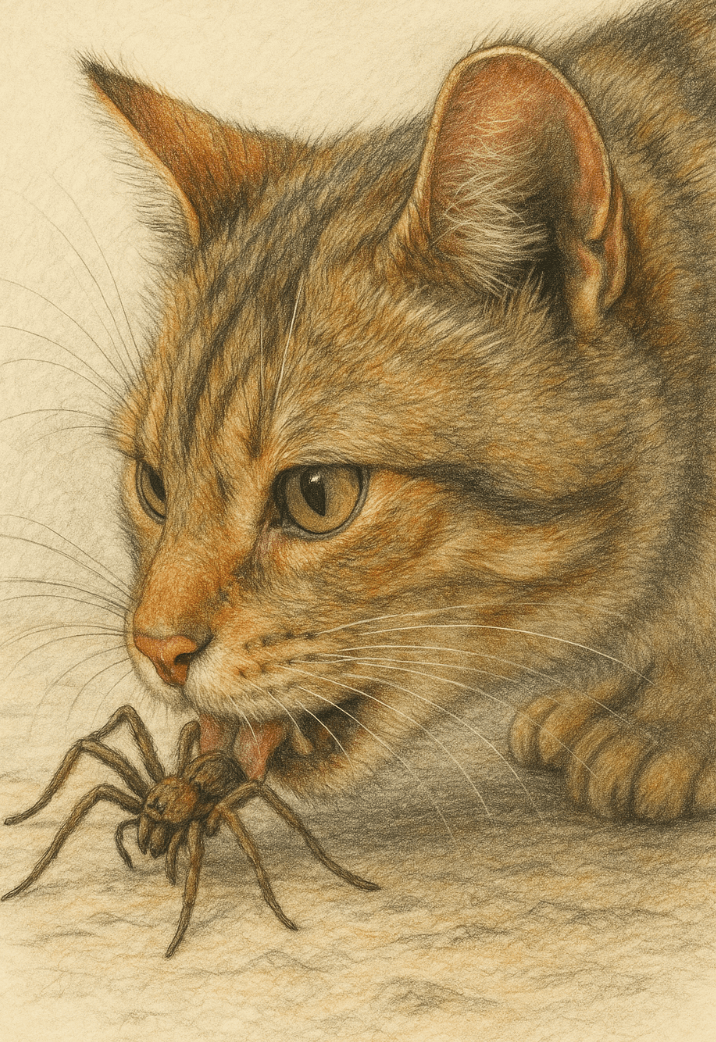Can Cats Eat Spiders?
Cats are natural hunters, and their curious nature often leads them to chase and pounce on small creatures like spiders. As a cat owner, you may have wondered whether it’s safe for your feline friend to eat spiders. While cats are generally skilled at handling tiny prey, not all spiders are harmless. Understanding the risks and benefits of this behavior can help you ensure your cat’s safety while allowing them to indulge in their instincts. In this blog post, we’ll explore everything you need to know about cats and spiders, from potential dangers to tips for keeping your pet out of harm’s way.
Potential Risks of Cats Eating Spiders
While most spiders are harmless to cats, some can pose serious risks if ingested or bitten. Here are the potential dangers associated with cats eating spiders.
Venomous Spider Bites:
Certain venomous spiders, like black widows or brown recluses, can deliver painful and potentially dangerous bites to cats.Choking Hazards:
Larger spiders may cause choking if swallowed whole, especially for smaller cats or kittens.Gastrointestinal Irritation:
The exoskeletons of spiders can irritate a cat’s digestive system, leading to vomiting or diarrhea.Toxic Reactions:
Some spiders carry toxins that, while rarely fatal, can cause mild to moderate reactions in sensitive cats.Parasite Exposure:
Spiders may carry parasites or bacteria that could be transmitted to your cat upon ingestion.
These risks highlight the importance of monitoring your cat’s interactions with spiders and taking precautions to minimize potential harm.
Benefits of Cats Eating Spiders (If Safe)
In some cases, eating spiders can be relatively harmless or even beneficial for cats. Here’s how this behavior might align with their natural instincts and health.
Satisfying Hunting Instincts:
Chasing and eating spiders allows cats to engage in their natural predatory behaviors, providing mental stimulation.Dietary Variety:
While not a significant source of nutrition, spiders offer a small amount of protein that can supplement a cat’s diet.Pest Control:
By hunting spiders, cats help keep your home free of these eight-legged intruders, reducing the need for chemical pest control.Bonding Through Play:
Watching your cat hunt spiders can be an entertaining way to bond and observe their unique personality.Minimal Harm from Non-Venomous Species:
Most common household spiders are non-venomous and unlikely to cause harm if eaten by a healthy adult cat.
While there are some benefits, it’s crucial to ensure that the spiders your cat encounters are safe and non-threatening.
Check this guide 👉Can Cats Eat Mint? Best 7 Expert Tips!
Check this guide 👉Can Cats Eat Dog Treats? Best 7 Expert Tips!
Check this guide 👉Can Cats Eat Salami? Best 7 Expert Tips!

Safe Practices for Cats Around Spiders | Danger Signs to Watch For |
|---|---|
Keep your home spider-free with safe traps | Swelling or redness around the mouth |
Monitor your cat’s behavior during play | Excessive drooling or vomiting |
Educate yourself on local venomous spiders | Lethargy or unusual weakness |
Provide alternative toys for hunting | Difficulty breathing or signs of distress |
Consult a vet if unsure about spider types | Persistent diarrhea or abdominal pain |
How to Keep Your Cat Safe Around Spiders
Preventing harmful encounters between your cat and spiders is key to ensuring their well-being. Follow these steps to create a safer environment.
Identify Venomous Spiders in Your Area:
Research which spiders in your region are dangerous and take steps to avoid attracting them into your home.Use Pet-Safe Pest Control:
Opt for non-toxic methods like sticky traps or natural repellents to manage spider populations without harming your cat.Inspect Your Home Regularly:
Check dark corners, basements, and attics for spider webs or hiding spots, and remove them promptly.Provide Engaging Alternatives:
Offer interactive toys or puzzle feeders to redirect your cat’s hunting instincts away from real spiders.Supervise Outdoor Time:
If your cat goes outside, keep an eye on their activities to prevent encounters with potentially harmful spiders.
By taking these precautions, you can reduce the likelihood of dangerous situations while allowing your cat to explore safely.
Signs Your Cat May Have Eaten a Dangerous Spider
Even vigilant owners may occasionally miss incidents involving their cat and spiders. Knowing the warning signs can help you act quickly if something goes wrong.
Visible Bite Marks:
Look for puncture wounds or irritation on your cat’s skin, especially around the face or paws.Swelling or Redness:
Localized swelling or redness near the bite area may indicate a reaction to venom.Lethargy or Weakness:
A sudden lack of energy or difficulty moving could signal poisoning or illness.Excessive Drooling or Vomiting:
These symptoms often occur if your cat has ingested something toxic or irritating.Difficulty Breathing:
Labored or rapid breathing is a serious sign that requires immediate veterinary attention.
Recognizing these signs early allows you to seek prompt medical care and prevent complications.
Common Misconceptions About Cats and Spiders
Several myths surround cats’ interactions with spiders, leading to confusion among pet owners. Clarifying these misconceptions helps set realistic expectations.
Cats Are Immune to Spider Venom:
While cats are more resistant than humans, they are not completely immune to venomous spider bites.All Spiders Are Harmless Indoors:
Even indoor spiders can include venomous species, depending on your location.Eating Spiders Is Always Safe:
Some spiders’ exoskeletons or toxins can irritate a cat’s digestive system, making it unsafe in certain cases.Cats Know Which Spiders to Avoid:
Cats may not always distinguish between harmless and dangerous spiders, so supervision is key.Spider Bites Are Rare in Cats:
Though rare, bites can still happen, especially if your cat actively hunts spiders.
Dispelling these myths ensures a better understanding of your cat’s behavior and safety.
Steps to Take if Your Cat Encounters a Venomous Spider
If you suspect your cat has encountered or eaten a venomous spider, quick action is essential. Follow these steps to address the situation effectively.
Separate Your Cat from the Spider:
Remove your cat from the area to prevent further bites or ingestion.Assess for Symptoms:
Check for visible signs of a bite or ingestion, such as swelling, drooling, or lethargy.Contact Your Veterinarian:
Call your vet immediately to describe the incident and receive guidance on next steps.Do Not Induce Vomiting Without Advice:
Attempting to make your cat vomit could worsen the situation; always consult a professional first.Monitor Closely:
Keep a close eye on your cat’s condition until you can get them to the vet for evaluation.
Acting calmly and decisively minimizes risks and ensures your cat receives proper care.
Alternative Ways to Satisfy Your Cat’s Hunting Instincts
Redirecting your cat’s focus away from spiders can reduce the chances of harmful encounters. These alternatives provide safe and engaging ways to fulfill their hunting instincts.
Interactive Toys:
Feather wands, laser pointers, and motorized mice mimic the thrill of hunting without the risks.Food Puzzles:
Puzzle feeders encourage problem-solving and reward your cat with treats, satisfying their natural drive.Window Perches:
Placing a perch near a window lets your cat observe birds and insects safely from indoors.Catnip-Filled Toys:
Toys infused with catnip stimulate excitement and mimic the unpredictability of live prey.Scheduled Playtime:
Daily play sessions with you help burn off excess energy and reduce their desire to hunt spiders.
These alternatives ensure your cat stays entertained while minimizing potential dangers.
Frequently Asked Questions About Cats and Spiders
Are all spiders dangerous to cats?
No, most household spiders are harmless, but venomous species like black widows can pose risks.
What should I do if my cat eats a spider?
Monitor your cat closely for any unusual symptoms and contact your vet if you suspect venom exposure.
Can indoor cats encounter dangerous spiders?
Yes, venomous spiders can occasionally enter homes, so it’s important to stay vigilant.
How can I discourage spiders from entering my home?
Use natural deterrents like essential oils, keep your home clean, and seal cracks or gaps.
Is it normal for cats to eat spiders?
Yes, it’s a natural behavior rooted in their hunting instincts, but it’s best to ensure they’re eating safe ones.
Balancing Curiosity and Safety for Your Feline Friend
Cats and spiders share a natural dynamic driven by instinct and curiosity. While most encounters are harmless, understanding the potential risks ensures you can protect your cat from harm. By staying informed, taking preventive measures, and acting quickly if issues arise, you can let your cat enjoy their natural behaviors without compromising their health. Remember, your role as a pet owner is to nurture their instincts while keeping them safe—so embrace the quirks of your feline hunter with confidence and care.
Do Cats Have Taste Buds? Best 7 Expert Tips! – Discover how cats experience flavors and why their taste is so unique.
Do Dogs Have Taste Buds? Best 7 Expert Tips! – Discover how dogs experience taste, their preferences, and what it means for their diet and health.
Can Cats Taste Sweet? Best 7 Expert Tips! – Discover why cats can’t taste sweetness, how it affects their diet, and tips to keep them healthy and happy.
Can Dogs Taste Sweet? Best 7 Expert Tips! – Discover how dogs perceive sweetness, which foods are safe, and tips to manage their sweet cravings responsibly.





